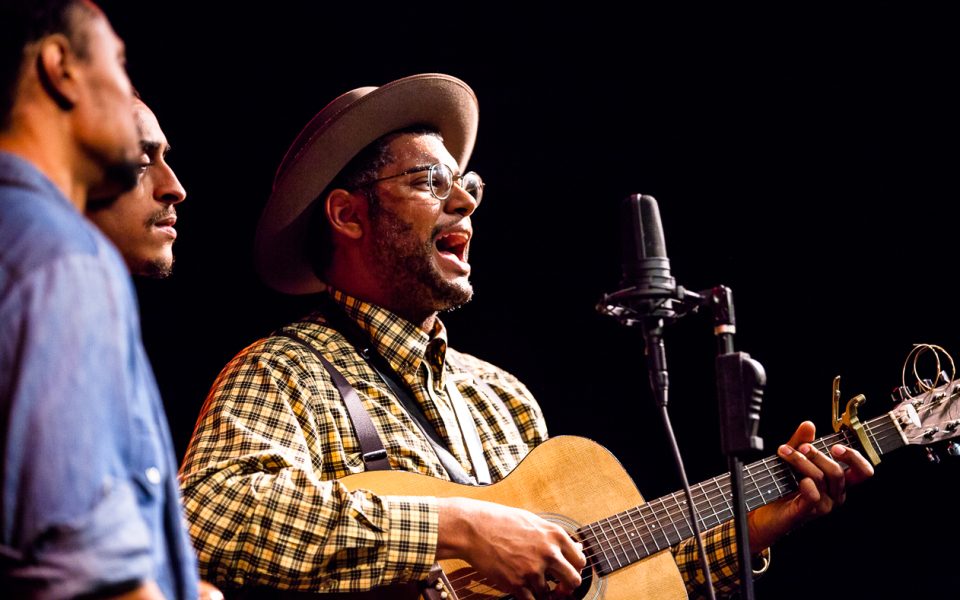Photo by Caleb Smallwood
by Jordan Green
As a 33-year-old black man playing the banjo, he almost throws it in your face how uncool he is.
The wide-brimmed hat, the round spectacles, the scruffy beard, the flannel shirt, the suspenders, even the way he leans into the old-time radio microphone at the end of a song and says, “Thank you very much everybody,” with a slight, nervous laugh, they all peg Dom Flemons to an earlier time, not quite a century past.
Midway through his first set at the Crown in Greensboro on Sunday, Flemons — a founding member of the esteemed Piedmont black string-band ensemble the Carolina Chocolate Drops — told a story about busking on the subway when he lived in New York City from 2009 to 2013. When audiences in the subway don’t dig your music, he said, “they give you a real hard stare.” And they were giving him a “real hard stare” as he played “In the Jailhouse.”
“Considering the times, I changed some of the lyrics,” Flemons said. “Then some things started happening in our country that made me change them back.”
The song was in heavy rotation among the white hillbilly bands of the late ’40s that were playing a prototype of early rock and roll, and had been popularized by Jimmie Rodgers, a country artist known as the “blue yodeler.” But there’s little doubt among music historians that the song originated with black jug bands in Louisville and Memphis.
The broad smile, an affectation of an entertainer eager to please his audience, might at first seem out of time. But how different is it from the mask of courtesy that might well make the difference between life and death for a black man encountering a cop during a late-night traffic stop in 21st Century America. Casting aside the slapstick moralism of Rodgers’ adaptation, Flemons sang the lyrics of an earlier version by the Memphis Jug Band, which concerns a number of ill-fated characters like Sam Jones who finds himself regretting his decision to vote twice in an election “instead of staying at home, leaving the white folks’ business alone,” and Henry Crew, who “sold that no good brew, sold it to the police on the beat” in exchange for marked bills. Flemons wailed on the banjo, jamming out a syncopated rhythm that was percussion and horn section all rolled into one, and then grabbed the entrails of the melody and dispatched a stinging solo.
In an era when everyone in pop, electronic, hip hop and rock seem to be “drinking from the same stream,” as Flemons put it, going backwards is one way to cast off the burden of influence. Not that anyone is completely free. But Flemons’ influence is the songster Papa Charlie Jackson — who you’ve probably never heard of — as opposed to the iconic bluesman Robert Johnson, so he can adapt the material to his own needs without anyone being the wiser.
Flemons’ musical interests are voracious. Before helping to cement the legacy of Piedmont black string-band music, he made a scholarly discipline of learning about jug-band music, blues, jazz, old country and early rock and roll. And his choice of homely acoustic instruments — banjo, guitar, harmonica, bones and fife — disguises the fact that he’s a killer musician. Although he considers himself a traditionalist, in the sense that he recognizes that there’s a right way and a wrong way to play music, he’s gotten free in a way that few of his contemporaries with effects-laden guitars and turntables have.
He can play whatever he wants, in other words.
Notably, when Flemons introduced his trio — bassist Brian Farrow and drummer Tarek Mohamed — he started with a self-penned country number called “Have I Stayed Away Too Long?”
He explained that his father fell in love with country music growing up in Flagstaff, Ariz.
“There was only radio station in town,” he said, “so they played a different style of music every hour.”
Flemons’ plaintive vocals could have easily been sung by Roy Acuff — who he covered during the set — and his boom-chucka rhythm on acoustic guitar galloped as Farrow plucked the root notes and Mohamed tapped out a restrained beat on a snare drum.
“The country’s obsessed with the idea of a white guy who can sound black,” Flemons noted before the concert, “but they’re never obsessed with the type of black musician who can sound white.”
He played an original called “Too Long I’ve Been Gone” that’s written in the mold of ’60s singer-songwriter folk pop like Simon & Garfunkel, because why not? He channeled Fats Domino’s “Going to the River” on acoustic guitar replete with a falsetto vocal-turn because the Winston-Salem bluesman Cootie Stark favored it. He provided virtuoso demonstrations of the bones and quills, and dredged up nearly forgotten gems by Ma Rainey, the Beale Street Sheiks and Henry Thomas.
Flemons paid tribute to a beloved dish he sampled in East Nashville in a rendition of his song “Hot Chicken,” a high-octane blues that mixed his dexterous fingerpicking with the elemental combustion of his capable rhythm section. With Farrow taking a solo on bass, then Mohamed on drums, and finally Flemons exploding with a mercurial rockabilly solo on the guitar, he proved a point.
It’s all black music, and it’s all American music.
Join the First Amendment Society, a membership that goes directly to funding TCB‘s newsroom.
We believe that reporting can save the world.
The TCB First Amendment Society recognizes the vital role of a free, unfettered press with a bundling of local experiences designed to build community, and unique engagements with our newsroom that will help you understand, and shape, local journalism’s critical role in uplifting the people in our cities.
All revenue goes directly into the newsroom as reporters’ salaries and freelance commissions.



Leave a Reply